Spying, targeting and arresting: The secret police war on Black activists
By Barrington M. Salmon -Contributing Writer- | Last updated: Apr 19, 2018 - 12:14:44 PMWhat's your opinion on this article?
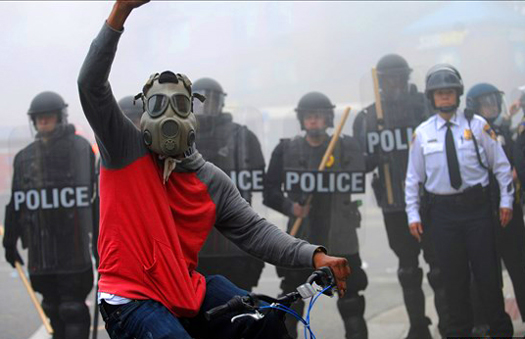
A protester rides his bike in front of a police line in Baltimore, April 27, 2015.
|
WASHINGTON—Since 2014, the federal government and instruments of the state have been spying on Black activists who’ve been engaged in a palette of civil disobedience methods including marches, sit-ins, blocking highways and thoroughfares.
Prompted by police killings of primarily unarmed Black men, women and children by law enforcement, the activists, since 2013, have been disrupting everyday life for lawmakers, law enforcement and others in cities as varied as Oakland, Seattle, Ferguson, Mo., New York and Washington, D.C., to bring attention to the need to confront and eliminate institutional racism, injustice and police brutality.
And despite the fact that the constitution protects the right to protest and exercise free speech, federal law enforcement, state and local police have been waging a secret war against Black activists, said Rashad Robinson, executive director of Color of Change.
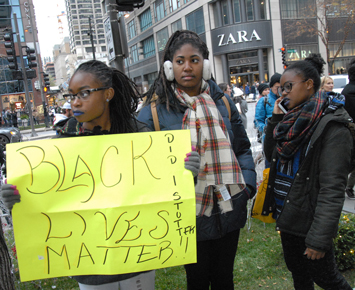
Chicago Black Friday protest
|
“We launched this effort in July 2016 after hearing a growing number of troubling stories from Black activists following the emergence of the #BlackLivesMatter movement, stories about activists being followed around grocery stores, identified and arrested before events, along with many other suspicious developments,” Mr. Robinson said. “The federal government, often in coordination with local police departments across the country, continues to use its expanded authority, dating from the beginning of the ‘War on Terror,’ to demonize and intimidate Black activists—people who are rightly demanding that our country be more just—through surveillance and harassment.”
In March of 2018, Color Of Change, the Center for Constitutional Rights, and the Milton Kramer Law Clinic at the Case Western Reserve University School of Law filed a motion in the Southern District Court of New York, asking the court to order the Department of Homeland Security to release a blacked-out memo referred to in government documents as the “Race Paper.”
This motion followed a July 2016, Freedom of Information Act request filed by these groups with the Department of Homeland Security and Federal Bureau of Investigation to obtain information on the surveillance and monitoring of Black protesters exercising their First Amendment rights at protests across the country from August 2014 to the present, said Mr. Robinson.

|
In May of 2017, the Southern District Court ordered the FBI and DHS to produce the documents and authorities turned over almost 7,000 pages of related documents, some of which were fully or partially redacted. Documents released in November and March included alarming revelations about the extent of anti-Black surveillance at these agencies as well as a “Race Paper.”
“The FBI and Department of Homeland Security are at war with Black activists,” said Mr. Robinson, who heads the nation’s largest online racial justice organization which helps people respond effectively to injustices. “The documents we’ve forced the federal government to release expose how these agencies are demonizing and intimidating Black activists,” he said.
Human rights attorney Barbara R. Arnwine said the government activities are a clear indication that COINTELPRO has continued to prey on Black activists and their allies.
“For Whites, Black racial struggles are militant and dangerous. This idea is persistent in federal law enforcement,” said Ms. Arnwine, president and founder of the Transformative Justice Coalition. “On the 50th anniversary of the assassination of Dr. Martin Luther King, this is another powerful reminder that our struggles for justice remain dangerous. As activists, we must be conscious that the belief to exercise the right to live safely and justly is seen by Whites as dangerous. This sentiment needs to be destroyed. Our people have to be cognizant of this reality. Federal and state forces have reacted to a false narrative.”
“The Black Panther Party was destroyed and Dr. Martin Luther King was targeted. Protesters set themselves up for serious vulnerability. The fight for struggle and liberation is threatening to White structure which seeks to continue to dominate people of color.”
“This really proves that COINTELPRO never went away,” she continued. “We have to demand that surveillance not be engaged by law enforcement. It’s very important for law enforcement agencies be required to screen out White supremacy. What we’re seeing is the deliberate opposition by those who have infiltrated law enforcement. The failure of the FBI to concentrate on this infiltration is troubling.”
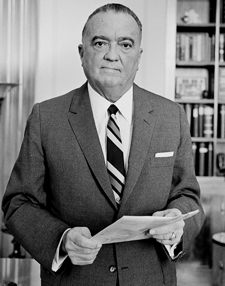
J. Edgar Hoover
|
FBI director Hoover was concerned that a Black Messiah not emerge and went about the business of killing anything positive that Black groups produced and to keep the groups from uniting or gaining respectability. COINTELPRO discredited political organizations he deemed subversive or threatening.
Agents in COINTELPRO targeted groups and individuals including Rev. Dr. Martin Luther King, American Indian Movement, the Nation of Islam, the Black Panther Party, SCLC, SNCC, the U.S. Communist Party, feminist organizations, opponents of the Vietnam War, independence movements, the Young Lords, Black-owned bookstores and leftist organizations.
Mr. Robinson noted that one FBI email chain showed the agency maintains 24-hour surveillance of some Black activists: The agent noted that a fresh team had arrived to relieve an FBI surveillance unit parked outside a particular activist’s home. Another set of documents showed how the FBI performed a detailed search of the vehicle records of someone who was either visiting an activist or happened to be parked in front of that activist’s house, essentially criminalizing a person simply for associating with that activist.
“Black and Brown activists and the public in general should not be left to speculate as to why DHS prepared a document called the ‘Race Paper,’ circulated multiple versions of it, and called for in-person meetings to discuss its contents, but now fights to keep every word from seeing the light of day,” said Omar Farah, senior staff attorney at the Center for Constitutional Rights. “But given the long-standing and unconstitutional pattern of state surveillance of Black-led political movements, it bears repeating that FOIA is about transparency, not protecting government agencies from embarrassment.”
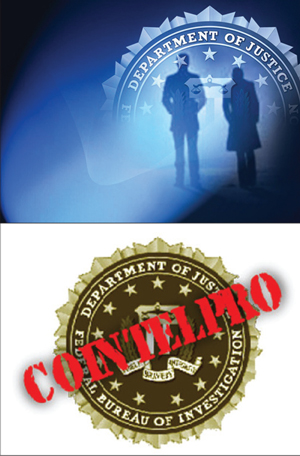
|
“Absolutely, this happens all the time. As technology becomes cheaper and cheaper and easier and the legal community has not caught up with capacity and with the increase in fear and hype, that makes it easier and easier to surveille people,” said Mr. Hassan, co-founder of the Black Movement Law Project. “So many people’s information is online and the unholy trinity of private sector data extraction, the over-hyped fear of all thing foreign and surveillance make it easy to track people.”
“Technology is a double-edged sword. Technology facilitates liberation and education but it matters who controls the technology. Power stands with the government and the corporate sector which caters to the needs of those in control,” he added.
Mr. Hassan said surveillance and monitoring should not deter those seeking to challenge institutional racism and other social ills.
“People have to make their call about how they choose to protest,” he said. “I’m not trying to discourage anyone but they should be aware of the reality of what police have done. They should not stop expressing themselves politically.”
Mr. Farah, in an interview with Janine Jackson, said that the FBI and Department of Homeland Security are using “predictive intelligence” in an attempt to predict criminality.
“That’s one of the most pressing fears that I have, in speculating about what might actually be behind these redactions,” he said. “Some of the emails that accompanied the transmission of the ‘Race Paper’ within DHS I&A, the Intelligence and Analysis Office, included references to things like ‘drivers’ and ‘indicators.’ ”
“Now, I have to be perfectly honest: We just don’t know what the document says. But those terms, to me, in the absence of any other information, suggest ways in which law enforcement and intelligence agencies within the government have in the past tried to use indicators that would help them predict criminality or behavior,” he said.
“Those things, of course, are invariably based on totally bunk analytical frameworks that ascribe behavioral tendencies to certain protected classes of people–by race, and oftentimes by religion, we’ve seen, in a national security context. Those are things that the public needs to be aware are potential uses of this Race Paper, and it certainly deserves full scrutiny.”
Mr. Farah said he’s concerned because “we’ve seen it in stop and frisk; we’ve seen it in counter-terror-related policing, and it’s one of the things that made the documents jump out at us, amongst the thousands of documents we got.”
The Rev. Graylan Hagler, who took a break from planning the New Poor People’s Campaign with the Rev. William J. Barber, II, suspects the Trump administration has ramped up the monitoring and surveillance.
“Black Lives Matter was all over the streets, all over the country. Then this administration came in and people retreated,” said Rev. Hagler, senior pastor at Plymouth Congregational Church in Washington, D.C. “Their effort to undermine the efforts of those on the streets harkens back to COINTELPRO. But we can’t retreat. You have to live out your issues in the public because that’s your best protection. It ensures that people can see what you’re doing,” said the pastor.
“We cannot just step back. I don’t think this is a replay of the Civil Rights era. We’re in a historic moment. The contradiction of this country is revealed in a real way. We have gotten complacent. They thought we had succeeded under President Obama. We assumed that White supremacy was gone, that virulent racism was gone. But all it did was to change form and assume a different type of energy. None of this has gone away.”
Rev. Hagler said Blacks have the technology to organize and mobilize.
“We have to build our own power politics and engage in disruption of the system. We must organize people not to get gravy. We must participate in transformational not transactional politics. The political system has to go through radical reform in its political and economic output,” he said.
Mr. Robinson agreed about the need to continue to confront the tyranny of the federal government.
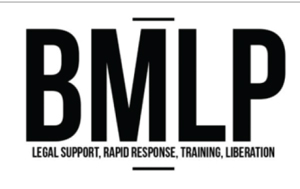
|
“Up until recently, we’ve known very little about the government’s surveillance of our communities. But, by forcing the disclosure of more information about these surveillance efforts, including our demand today for the full and unredacted Race Paper, we can better understand these attacks on Black activism and fight to prevent a new generation of Black activists from demonization, incarceration, intimidation, and punishment,” he concluded.
INSIDE STORIES AND REVIEWS
-
-
About Harriett ... and the Negro Hollywood Road Show
By Rabiah Muhammad, Guest Columnist » Full Story -
Skepticism greets Jay-Z, NFL talk of inspiring change
By Bryan 18X Crawford and Richard B. Muhammad The Final Call Newspaper @TheFinalCall » Full Story -
The painful problem of Black girls and suicide
By Charlene Muhammad -National Correspondent- » Full Story -
Exploitation of Innocence - Report: Perceptions, policies hurting Black girls
By Charlene Muhammad -National Correspondent- » Full Story -
Big Ballin: Big ideas fuel a father’s Big Baller Brand and brash business sense
By Bryan Crawford -Contributing Writer- » Full Story






 Click Here Stay Connected!
Click Here Stay Connected!








